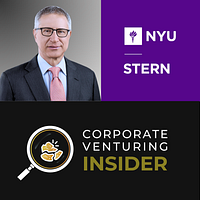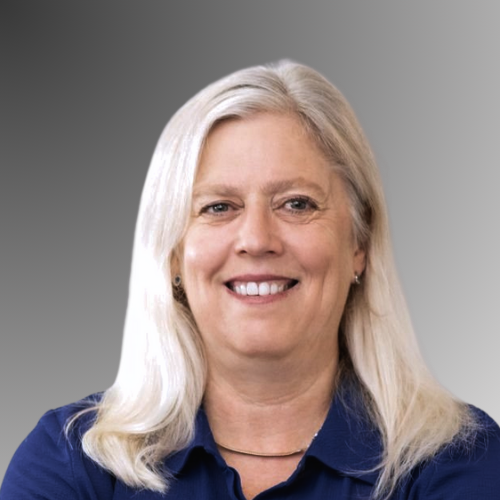A Liberal Arts Approach to Private Equity and Venture Investing with Gustavo Schwed of NYU Stern and Princeton
Interviewed March 4th, 2025
When it comes to decoding the crossover between corporate venture capital and private equity, few are as uniquely positioned as Gustavo “Gus” Schwed. In episode #106 of Corporate Venturing Insider, TDK Ventures President Nicolas Sauvage sat down with the NYU Stern and Princeton professor to pull apart a decades-spanning career — one that stretches from high-stakes LBOs in Europe to running an endowment’s VC and PE portfolio, with a brief two-year stint in corporate venture capital (CVC) early on. The conversation unearthed a wealth of insight for corporate venturing professionals, fund managers, and students alike.

From Liberal Arts to Leveraged Buyouts
Gus began his career from an unlikely launchpad: Swarthmore College, a liberal arts school with no business, finance, or accounting classes. Armed with strong critical thinking and quantitative skills, he joined Donaldson, Lufkin & Jenrette (DLJ) as an analyst, despite not fully understanding what the firm did. The allure was clear: “I knew that it was a job that attracted a lot of people who were focused on success and achievement,” Gus recalled.
Those first two years — steeped in mergers and acquisitions — gave him a crash course in the transactional world. But the relentless pace was unsustainable. “The lifestyle was just… really working around the clock, and there was virtually no regard to my life outside of work.”
Business school at Stanford followed, exposing him to the heart of Silicon Valley. Though venture capital jobs were scarce, Gus leveraged his DLJ connections to join Sprout Group, DLJ’s own venture arm — his one direct foray into CVC. It was here that Gus learned what it meant to think like an investor. “You have to be able to balance risks and upsides,” he said. “I also learned the hard way the pain and agony that comes from making a bad investment.”
The Private Equity Expansion
After six years of investing in medical devices at Sprout, Gus felt his world was becoming too narrow. He joined DLJ’s merchant banking fund and was tasked with launching its Latin America private equity business — an opportunity that leveraged his upbringing across five Latin American countries and his multilingual fluency in English, Spanish, and Portuguese.
That Latin American venture was promising but ultimately derailed by currency collapses in Brazil, instability in Argentina, and general macroeconomic chaos in 1998 in South America. Rather than being fired, Gus was asked to wind it down and offered a choice: move to New York or London. He chose London, where he became co-head of Morgan Stanley’s European private equity business.
His next chapter at Providence Equity Partners put him in the driver’s seat of several major deals, including a watershed moment in European finance. “It was the largest LBO in European history at the time, a $15 billion deal,” he said, referring to the buyout of TDC in 2005, Denmark’s telecom incumbent. Though the Danish press criticized the private equity group as vultures, the team introduced digital upgrades, sold off non-core businesses, and exited successfully post-financial crisis. Still, Gus acknowledged, “We didn’t do a good job countering the narrative… and I’ve since learned that silence isn’t a strategy.”
Dissecting the Investor Mindset
The latter half of the podcast explored what Gus has learned about decision-making, discipline, and discomfort — topics especially relevant to CVC leaders operating at the interface of industry and innovation.
One repeated theme was the importance of skepticism without cynicism. “If you’re a cynic, you’re only good at seeing everything that can go bad — and then you never do a deal.” Equally dangerous, he added, is ignoring red flags because of “deal fever.”
For Gus, deep thinking — not gut instinct — has been the most reliable path to strong conviction. “You start with a superficial understanding, but then through iterative thinking, you gain a nuanced view of the business. That’s what gives you the right to take an investment position.”
He also offered a practical warning to emerging investors: never spin to an investment committee. “It’s a very bad idea to manipulate them. You need to be brutally honest about the risks — first with yourself, and then with the committee. If the deal goes bad, and the risks were known, it protects your integrity.”
The Value of Liberal Arts
Gus’s early liberal arts education, far from being a drawback, became a foundational strength. “By not specializing too early, I learned to break down unfamiliar topics quickly and develop domain expertise from scratch,” he explained. That capacity to learn on the fly enabled him to move from medical devices, to Latin American business, to European telecom — all without prior background in those domains.
“I tell my students: don’t worry too much about specializing early. Just develop the muscle to go deep into something new, because your career will change directions more than once.”
Nicolas noted that many of Gus’s choices — from launching a Latin America PE arm to moving to London — followed the road less traveled. “How did you get the courage?” he asked. Gus responded plainly: “It never felt like courage. It just felt like the right decision at the time.”
Lessons from the Agony of Bad Investments
When deals go south, Gus emphasized, they drain time, energy, and emotional bandwidth. “Most of the time, turnarounds don’t yield the results you want,” he said. The key is early detection — and being honest about what went wrong.
One major red flag: overly polished CEOs. “They’re often terrific communicators, but you have to break through the facade and really understand what makes them tick. Don’t let storytelling distract from operational gaps.”
He also warned about sunk-cost bias: “There’s a saying — act in haste, repent at leisure. That’s what a bad deal feels like.”
Teaching the Next Generation
Since joining NYU Stern in 2013, Gus has taught courses in private equity and entrepreneurial finance while serving as a Faculty Advisor to both the Stern Private Equity Club and the Latin American Business Association. He has earned the school’s Distinguished Teaching Award and been named Professor of the Year twice.
Today, he teaches three courses — two at NYU Stern and one at Princeton — and serves on Swarthmore College’s Board of Managers, where he formerly chaired the Finance Committee and oversees a $2 billion endowment with significant allocations to VC and PE.
His approach to selecting fund managers involves digging into attribution, team stability, value creation drivers, and concentration risk. But for “diamonds in the rough,” he stressed the importance of avoiding the herd: “If a VC pitches us a new fund to chase AI, I’d ask, how many others are chasing the same thing? That’s not a compelling strategy.” He stresses that a diamond in the rough needs to be contrarian and have a niche strategy; often, they can be smaller funds with a short track record.
A Vision for the Future
As the conversation closed, Gus offered a message that resonates with anyone navigating a career in venture or investing:
“The broader your view, the more effective you’ll be in the deal business. Don’t be afraid of discomfort — that’s where growth happens. Spend time abroad. Stretch your boundaries. And if you sense resistance from within, push through. You’ll usually find that the challenges weren’t as bad as you expected them to be.”
In a world that increasingly rewards hyper-specialization, Gus Schwed reminds us that intellectual range, integrity, and self-awareness still matter. Whether you’re a first-time investor or a seasoned corporate venture leader, that’s a lesson worth internalizing.

 Be skeptical, not cynical. Healthy skepticism helps you identify real risks. Cynicism, on the other hand, will keep you from acting on any opportunity. However avoid 'deal fever', ignoring red flags, on the opposite end of the spectrum as well.
Be skeptical, not cynical. Healthy skepticism helps you identify real risks. Cynicism, on the other hand, will keep you from acting on any opportunity. However avoid 'deal fever', ignoring red flags, on the opposite end of the spectrum as well. 


















